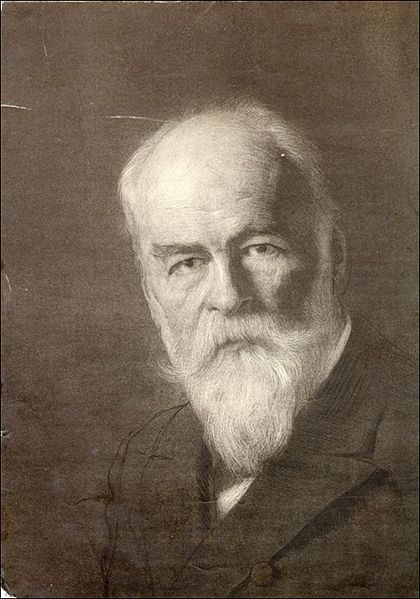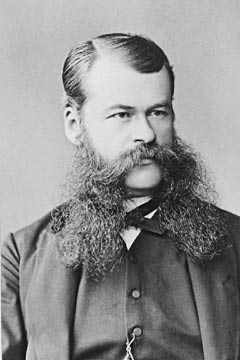<Back to Index>
- Economist Gustav von Schmoller, 1838
- Composer Louis Brassin, 1840
- Governor General of East Indies Rijcklof Volckerts van Goens, 1619
PAGE SPONSOR


Gustav von Schmoller (June 24, 1838 – June 27, 1917) was the leader of the "younger" German historical school of economics.
Schmoller was born in Heilbronn. His father was a Württemberg civil servant. Young Schmoller studied Staatswissenschaften (a combination of economics, law, history and civil administration) at the University of Tübingen (1857 – 61). In 1861, he obtained an appointment at the Württemberg Statistical Department. During his academic career he held appointments as a professor at the universities of Halle (1864 – 72), Strasbourg (1872 – 82), and Berlin (1882 – 1913). After 1899 he represented the University of Berlin in the Prussian House of Lords. He was a leading Sozialpolitiker (more derisively, Kathedersozialist – "Socialist of the Chair"), and a founder and long time chairman of the Verein für Socialpolitik, the German Economic Association, which continues to exist. Schmoller's influence on academic policy, economic, social and fiscal reform, and economics as an academic discipline for the time between 1875 and 1910 can hardly be overrated. He was also an outspoken proponent of the assertion of German naval power and the expansion of German overseas empire.
As an outspoken leader of the "younger" historical school, Schmoller opposed what he saw as the axiomatic - deductive approach of classical economics and, later, the Austrian school – indeed, Schmoller coined the term to suggest provincialism in an unfavorable review of the 1883 book Investigations into the Method of the Social Sciences with Special Reference to Economics (Untersuchungen über die Methode der Socialwissenschaften und der politischen Oekonomie insbesondere) by Carl Menger, which attacked the methods of the historical school. This led to the controversy known as the Methodenstreit, which today often appears as a waste of energies and one of the main reasons for the later demise of the whole historical school, although – as Joseph Schumpeter once pointed out – this was really a quarrel within that school. Schmoller's primarily inductive approach, requesting careful study, comparative in time and space, of economic performance and phenomena generally, his focus on the evolution of economic processes and institutions, and his insistence on the cultural specificity of economics and the centrality of values in shaping economic exchanges stand in stark contrast to some classical and most neoclassical economists, so that he and his school fell out of the mainstream of economics by the 1930s, being replaced in Germany by the successor Freiburg school.
However, it is often overlooked that Schmoller's primary preoccupation in his lifetime was not with economic method but with economic and social policy to address the challenges posed by rapid industrialization and urbanization. That is, Schmoller was first and foremost a social reformer. As such, Schmoller's influence extended throughout Europe, to the Progressive movement in the United States, and to social reformers in Meiji Japan. His most prominent non-German students and followers included William J. Ashley, W.E.B. Du Bois, Richard T. Ely, Noburu Kanai, Albion W. Small, and E.R.A. Seligman.
Since the 1980s Schmoller's work has been reevaluated and found relevant to some branches of heterodox economics, especially development economics, behavioral economics, evolutionary economics and neo-institutional economics. He has long had an influence within the subfield of economic history and the discipline of sociology.